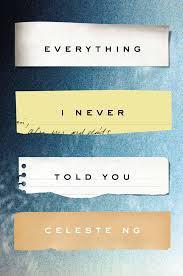 This was a powerful book. Somehow it tackles a really emotional subject but doesn’t leave you a weepy, nose-blowing mess.
This was a powerful book. Somehow it tackles a really emotional subject but doesn’t leave you a weepy, nose-blowing mess.
It begins with the disappearance and death of sixteen-year-old Lydia in a 1977 Ohio suburb. Her family struggles to understand what happened to her, and why. Wasn’t she an average, well-adjusted teenager?
Lydia is dead. But they don’t know this yet. 1977, May 3, six thirty in the morning, no one knows anything but this innocuous fact. Lydia is late for breakfast.
What unfolds is a story, told in both past and present, of an American family. Sadly it begins with the struggles of James and Marilyn, Lydia’s parents. James is Chinese, and his marriage to Marilyn, a white woman, in 1961 was so socially unacceptable that Marilyn never spoke to her mother again. They had three children, Nath, Lydia, and Hannah.
How had it begun? Like everything: with mothers and fathers. Because of Lydia’s mother and father, because of her mother’s and father’s mothers and fathers. Because long ago, her mother had gone missing, and her father had brought her home. Because more than anything, her mother had wanted to stand out; because more than anything, her father had wanted to blend in. Because both those things had been impossible.
Despite the struggles that James and Marilyn faced (or because of them), they don’t want to see that their children might face those same prejudices. They are kind, loving parents who want their children to have everything they didn’t. And that is the tragedy of this book.
In 1955, Marilyn enrolled at Radcliffe and wanted to be a doctor. She pursued that dream until she met James, a professor, and then as things so often do, the dream got put on hold. So she pours her dreams into Lydia. To give her credit, she asks Lydia constantly if physics and medicine are what she’s really interested in. Marilyn’s greatest flaw, besides her obsession with Lydia’s academic success, is how little interest she has in her other two children.
James wants their children to be well-liked. For him, being socially accepted is part of being happy. It’s what he feels his life has lacked.
Both parents make mistakes, but maybe their real mistake is one that most parents commit: thinking they know their children. My sisters, who have teenage daughters, will protest — but I’m not sure parents ever really know what their teenage children are all about. It’s a time in your life when you have secrets, when you see and do things that you’re sure you can’t tell anyone about. Parents think they know, but really they see what they want to see – or they see their own teenage experiences.
In truth, maybe we never really know anyone. But adults aren’t that complicated; teenagers are. I wouldn’t relive my teenage years for anything, and to be perfectly honest, there’s a part of me that didn’t want children because I don’t want to see them go through those years.
As you can see, I related to some aspects of this book on a personal level. At the same time, I have no idea what it’s like to be an outsider because of my race. Since this book takes place around the same time of my childhood, it made me think of how I perceived people of different races when I was young — and I can’t remember knowing more than one or two people who were not white. So this book isn’t about me, or whatever teenage traumas I might have had. It’s about growing up in a world of prejudice, where you’re an outsider at best, the subject of ugly stereotypes at worst.
The story is told from multiple viewpoints, and each one is compelling, especially Lydia’s relationship with her brother, Nath. Throughout this book you can see where the family ignored things they shouldn’t have, where misunderstandings occurred, and sadly, where Lydia could have done things differently. And yet, it’s not about who’s at fault.
Why is it set in 1977? The obvious answer is that this is probably when the author herself was a teenager. But also, I think the prejudice displayed towards Asians was much more blatant at this time, and a multiracial family would be fairly common today. Too, Marilyn’s experience trying to become a doctor in the mid-50s would be different today – easier, although the barriers of marriage and parenthood still apply.
I read a review of this book recently that described it as “balanced” and I think that’s a big reason I found this book so powerful. Most books about the death of a teen would be overdramatic. Here, I liked each character, I was compelled by each story, and gradually and artfully, this book paints a picture of a girl’s life that is definitely heartbreaking. And yet, it wasn’t an ugly-sobbing kind of book that leaves you feeling manipulated. You’re left remembering the story, not the weeping mess you were at the end of it.
I’m not sure how Ng pulled that off in her first novel, but I was impressed. This is a book I’ll be thinking about for a long time.

